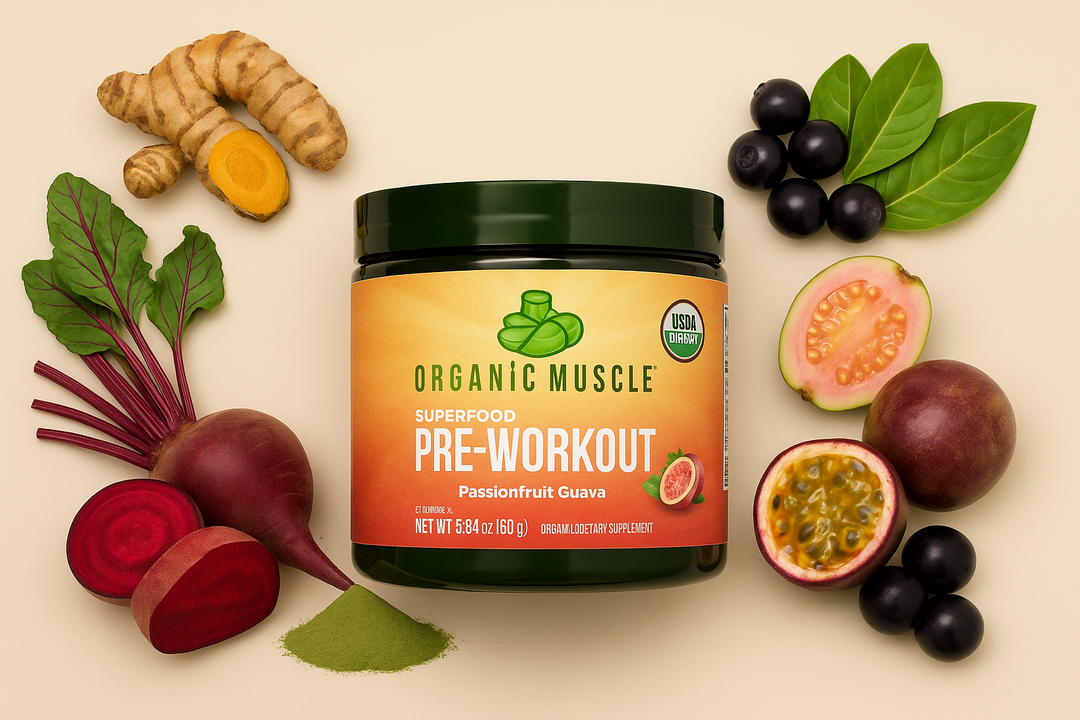Key Takeaways:
- Health and Fitness Benefits: Vegan protein powders provide essential amino acids necessary for muscle growth and recovery, supporting overall health without the common digestive issues linked to dairy-based proteins.
- Environmental Impact: Vegan protein powders offer a more sustainable choice with lower carbon footprints and less water and land use than animal-based protein sources.
- Dietary Versatility: Suitable for various dietary preferences and restrictions, vegan protein powders enhance dietary diversity and can be seamlessly integrated into numerous recipes and meals.
In a world where plant-based diets are becoming increasingly popular, whether vegan protein powder is viable for your health and fitness goals is more relevant than ever. Picture vegan protein powder as a sleek, modern tool in the fitness toolbox—promising both sustainability and muscle-building benefits, but how does it stack up against traditional whey protein?
At Organic Muscle, we pride ourselves on offering top-quality, scientifically formulated protein powders that cater to every dietary preference. Our extensive research and commitment to purity ensure that our vegan options meet the highest standards of efficacy and taste, helping you achieve your fitness goals without compromise.
In this article, we’ll explore the benefits of vegan protein powder, addressing key considerations such as nutritional value, digestibility, and overall effectiveness to help you determine if it’s the right choice for your dietary needs and fitness objectives.
What Is Vegan Protein Powder?
Vegan protein powder is a plant-based supplement designed for those seeking to increase their protein intake without consuming animal products. It's an excellent alternative for fitness and health enthusiasts who adhere to a vegan, vegetarian, or plant-based diet.
Unlike traditional protein powders, which derive their protein content from dairy sources like whey or casein, vegan protein powders utilize various plant sources. These typically include peas, brown rice, hemp, soy, and chia seeds. Each plant-based ingredient boasts a rich profile of essential amino acids, although some may need to be combined to ensure a complete amino acid profile.
The appeal of vegan protein powder is not limited to its plant-based origins. It's also highly regarded as inclusive and aligned with various dietary restrictions and preferences. In line with Organic Muscle’s commitment to health and safety, vegan protein powders are often formulated to be free from common allergens, synthetic additives, and harmful substances. They are Certified Organic, non-GMO, Vegan, Gluten-Free, Keto-Friendly, and Dairy-Free, ensuring that they meet the highest purity and nutritional value standards.
How Vegan Protein Powder Compares To Whey Protein
When exploring the question, "Is vegan protein powder good for you? " It's vital to consider how it compares to traditional whey protein, especially for fitness and health enthusiasts keen on maximizing their nutrition. Understanding the differences and benefits of each can help you make an informed decision that aligns with your health goals and dietary preferences.
Whey protein, derived from milk, has been the go-to protein supplement for bodybuilders and athletes for years. It's celebrated for its high biological value, containing all nine essential amino acids necessary for human dietary needs. Whey protein is also known for its fast absorption rate, making it a favorite for post-workout recovery.
Conversely, vegan protein powders offer a compelling plant-based alternative that aligns with various dietary needs and ethical choices. Made from sources like peas, brown rice, hemp, and soy, vegan protein powders include those following a vegan or lactose-intolerant diet and cater to individuals with allergies or sensitivities to dairy. While there has been a misconception about incomplete plant-based proteins, many vegan protein powders are carefully formulated to ensure they provide a complete amino acid profile by combining different plant sources.
Key Benefits Of Choosing Vegan Protein Powder
Understanding the benefits of vegan protein powder can illuminate why this dietary choice is effective for muscle building and recovery and aligns with a holistic approach to wellness.
Environmental Sustainability
One of the most compelling reasons for opting for vegan protein powder is its minimal environmental impact compared to animal-derived proteins. Production of plant-based proteins requires significantly less water, land, and energy, making it a sustainable choice for those conscious of their ecological footprint.
Hypoallergenic Properties
Vegan protein powders offer a superb alternative for individuals with sensitivities or allergies to dairy or soy. Our range, devoid of common allergens, chemicals, hormones, and preservatives, ensures that even the most sensitive individuals can receive their necessary protein intake without adverse reactions.
Rich in Fiber and Nutrients
Unlike their animal-based counterparts, vegan protein powders often contain fiber and essential nutrients. This not only aids digestion but also contributes to a feeling of fullness, potentially supporting weight management. Additionally, these plant-based powders frequently contain vitamins, minerals, and antioxidants, promoting overall health beyond muscle repair and growth.
Versatility
Vegan protein powders boast a versatile profile, suitable for shakes and incorporation into various recipes, from pancakes to soups. Their plant-based nature implies compatibility with various dietary preferences, including vegan, keto-friendly, and gluten-free diets, aligning with our commitment to cater to diverse nutritional needs.
Supports Healthy Muscle Recovery and Growth
Many people incorporate protein powder into their diets to enhance muscle recovery and growth. Vegan protein powders, particularly those combining multiple plant sources, provide a complete amino acid profile necessary for muscle repair and building. This ensures that regardless of dietary preference, fitness and health enthusiasts do not compromise on their body’s requirements for strength and recovery.
Popular Vegan Protein Sources
Vegan protein powders are derived from various plant-based ingredients, each with its unique nutritional profile. Here are some of the most popular vegan protein sources featured in high-quality supplements:
Pea Protein
Extracted from yellow split peas, pea protein is a high-quality protein source rich in essential amino acids, particularly branched-chain amino acids (BCAAs), which are vital for muscle growth and recovery. It's easily digestible and hypoallergenic, making it an excellent option for those with dietary restrictions.
Brown Rice Protein
Brown rice protein is complete, meaning it contains all nine essential amino acids. Though slightly lower in lysine, it's enriched with fiber and is gentle on the digestive system. It's particularly favored for its ability to aid in muscle recovery and lean muscle growth.
Hemp Protein
Hemp seeds are not only a complete protein source but also rich in omega-3 and omega-6 fatty acids, which contribute to heart health and reduce inflammation. Hemp protein is also packed with fiber, promoting digestive health while ensuring a feeling of fullness and aiding in weight management.
Chia Protein
Chia seeds are a good source of protein and high in omega-3 fatty acids, antioxidants, and fiber. When consumed as part of a protein powder, chia helps with hydration due to its ability to absorb water and provide sustained energy and satiety.
Quinoa Protein
Quinoa is a complete protein, rare for plant-based sources, and is naturally gluten-free. It's also rich in fiber, iron, magnesium, and manganese, making it a well-rounded nutritional powerhouse. When integrated into protein powders, quinoa supports muscle repair and growth while delivering essential minerals for overall health.
Pumpkin Seed Protein
Pumpkin seed protein is gaining popularity for its rich magnesium content and diverse profile of amino acids. It benefits heart and liver health, and its high zinc content supports the immune system. This makes it a versatile ingredient in vegan protein powders.
Factors To Consider When Selecting A Vegan Protein Powder
Below, we delve into key considerations for choosing the best vegan protein powder that caters to your needs.
Ingredient Quality
First and foremost, scrutinize the ingredient list. Opt for a protein powder that boasts certified organic, non-GMO ingredients to ensure you consume a product free from harmful pesticides and genetic modifications. A clean ingredient list signifies a commitment to your health, paramount in supporting your fitness and wellness journey.
Protein Source
Vegan protein powders derive their proteins from various plant-based sources such as peas, brown rice, and hemp. Each source offers a unique amino acid profile. Consider choosing a protein powder that blends multiple plant sources for a more comprehensive amino acid spectrum. This ensures you receive a well-rounded array of essential amino acids for muscle repair, growth, and overall body function.
Certifications and Standards
Certifications like Vegan, Gluten-Free, Keto-Friendly, and Dairy-Free provide an additional layer of assurance regarding the product's suitability for your dietary preferences and restrictions. Furthermore, opting for a powder-free from chemicals, hormones, sucralose, and preservatives aligns with a holistic approach to wellness, ensuring you're not introducing unwanted substances into your body.
Taste and Mixability
The flavor and texture of your vegan protein powder can greatly influence your enjoyment and consistency when using the product. Look for powders that mix well with your preferred beverages or recipes without clumping. Sampling different flavors or starting with a small purchase can help you find a product that pleases your palate and integrates seamlessly into your diet.
Nutritional Profile
Beyond protein, consider what additional nutrients the powder provides. Many vegan protein powders are fortified with vitamins, minerals, and superfoods, offering more comprehensive nutritional benefits. Reviewing the nutritional profile helps you select a protein powder that supports not just your protein intake needs but also contributes beneficially to your overall nutrient consumption.
Brand Reputation and Values
Selecting a protein powder from a brand that aligns with your values can further enhance your commitment to personal health and ethical considerations. Brands like Organic Muscle, which emphasize the importance of organic, vegan, and environmentally friendly products, are more likely to offer supplements that meet your health and ethical standards.
How To Incorporate Vegan Protein Powder Into Your Diet
Integrating vegan protein powder into your diet is an excellent way to support your health and fitness goals, regardless of whether you're a seasoned athlete or someone just beginning their wellness journey.
Vegan protein powder, like those in the Organic Muscle line, offers a high-quality, plant-based protein source that can complement a variety of dietary preferences and needs. Here are some simple and practical ways to incorporate vegan protein powder into your everyday diet.
Start with Smoothies
Smoothies are perhaps the most popular method for incorporating vegan protein powder into one’s diet. They’re versatile, allowing for a myriad of flavor combinations and ingredients. By adding a scoop of Organic Muscle vegan protein powder to your smoothie, you not only boost its protein content but also enhance its nutritional value without compromising taste.
Consider blending your favorite fruits, vegetables, a handful of leafy greens, and a scoop of protein powder for a delicious and nutritious breakfast or post-workout treat.
Enhance Your Breakfast
Breakfast is the day's most important meal, and adding vegan protein powder can make it even more beneficial. Sprinkle a scoop into your oatmeal, pancake batter, or homemade waffle mix to start your day with a protein-rich meal. This simple addition can help keep you fuller for longer, provide sustained energy, and ensure you're meeting your daily protein requirements.
Upgrade Your Baking
Baking with vegan protein powder is an innovative way to incorporate more protein into your diet. You can substitute a portion of flour in recipes for protein powder, adding a protein boost to cookies, muffins, and bread.
Organic Muscle’s vegan protein powders, free from chemicals, hormones, and preservatives, are ideal for health-conscious individuals who want to enjoy their favorite treats with added nutritional benefits.
Mix into Soups and Sauces
For those seeking a savory application, vegan protein powder can also be an excellent thickener for soups and sauces. This is a subtle way to increase the protein content of your meals without altering the taste significantly. Plus, it’s a fantastic method for those who may not prefer smoothies or baked goods.
Craft Your Own Protein Bars
Homemade protein bars are a convenient and customizable snack option. By combining vegan protein powder with ingredients like nuts, seeds, oatmeal, and dried fruit, you can create various flavors and textures. These bars are a healthier alternative to store-bought options and cater to your specific dietary preferences and nutritional needs.
Environmental Impact of Vegan vs. Animal-Based Protein Powders
In an era when sustainability and environmental stewardship are crucial, the discussion of the impact of our dietary choices has come to the forefront. One aspect of this broader dialogue involves comparing the environmental footprints of vegan and animal-based protein powders.
Production Emissions
The production of animal-based protein powders is inherently linked to livestock farming, a significant source of greenhouse gases, notably methane, nitrous oxide, and carbon dioxide. These emissions contribute to global warming and climate change.
On the other hand, vegan protein powders derived from plants such as peas, rice, and hemp generally require less water and land and generate lower carbon emissions. This lower environmental impact makes vegan protein powders appealing for those looking to reduce their ecological footprint.
Land and Water Use
Animal agriculture is also one of the leading causes of deforestation, water pollution, and biodiversity loss. Substantial land and water are required to produce animal-based proteins than plant-based ones.
For instance, producing whey protein, a popular animal-based supplement, involves dairy farming, which demands large volumes of water for cattle and to grow feed crops. Vegan protein powders, in contrast, directly utilize plants, thereby skipping the resource-intensive step of feeding crops to animals first. This efficiency translates to a much lower demand for natural resources.
Chemicals and Antibiotics
The production of animal-based proteins often involves using antibiotics and growth hormones to increase yield, which can lead to antibiotic resistance and hormonal imbalances in the ecosystem.
Vegan protein powders, especially those that are Certified Organic and non-GMO, are produced without the use of harmful chemicals, hormones, sucralose, and preservatives. This approach benefits consumer health and reduces the chemical load released into the environment.
Biodiversity
Expansive grazing and feed crop cultivation for animal agriculture can lead to habitat destruction, which, in turn, threatens biodiversity. If managed sustainably, plant-based protein cultivation can be less intrusive and support biodiversity by preserving natural habitats and employing crop rotation methods that maintain soil health.
The shift towards vegan protein powders aligns with a broader commitment to our and the planet's health. Individuals can significantly lower their environmental impact by opting for plant-based protein supplements, contributing to a healthier and more sustainable world.
Final Thoughts
In the quest for optimal health and fitness, the question "Is vegan protein powder good for you?" finds a resounding affirmation. Vegan protein powders, especially when they are Certified Organic, non-GMO, Vegan, Gluten-Free, Keto-Friendly, and Dairy-Free, like those offered by Organic Muscle, provide a powerful, healthful alternative to traditional animal-based supplements. Without the baggage of chemicals, hormones, sucralose, and preservatives, these plant-based supplements promise both fitness and holistic wellness.
Organic Muscle's commitment to crafting safe and effective supplements means that health and fitness enthusiasts can trust in the quality and integrity of their vegan protein powders. This isn't just about meeting your daily protein requirements; it's about nourishing your body in the cleanest way possible, aligning with a lifestyle that values sustainability and ethical consumption.
Read also:
- Should You Combine Pre Workout And Protein Powder?
- Are There Risks To Consuming Expired Pre-Workout Supplements?
- How To Increase Your Protein Intake
Frequently Asked Questions About Is Vegan Protein Powder Good For You?
Can Vegan Protein Powder Provide Enough Protein?
Yes. Vegan protein powders are designed to meet the protein needs of both athletes and anyone looking to augment their protein intake. These powders are typically made from peas, rice, hemp, and other plant sources, offering substantial protein in every serving. When incorporated into a balanced diet, vegan protein powder can efficiently support muscle repair, growth, and overall health just as well as their animal-based counterparts.
Is Vegan Protein Powder Complete with All Essential Amino Acids?
Yes, many vegan protein powders are formulated to ensure they contain all nine essential amino acids, making them complete proteins. This is often achieved by blending different plant proteins, such as pea and rice, to create a complete amino acid profile. This ensures you’re not missing out on any crucial building blocks for protein synthesis, which is important for muscle growth and repair.
Are There Any Side Effects to Taking Vegan Protein Powder?
Vegan protein powders, especially organic, non-GMO, and free from chemicals and preservatives, are generally safe and well-tolerated by most people. However, as with any dietary supplement, some individuals may experience digestive upset, especially if they are not used to high amounts of protein or fiber. It’s important to start with a smaller serving size and gradually increase it to assess tolerance.
Is Vegan Protein Powder Safe for Everyone?
Vegan protein powders are a safe option for most people, including those lactose intolerant, dairy allergic, or following a vegan or vegetarian diet. However, individuals with specific health conditions or allergies to particular plant-based ingredients should consult a healthcare professional before adding a new supplement.
How Much Vegan Protein Powder Should You Consume Daily?
The amount of vegan protein powder you should consume daily depends on your age, gender, weight, and level of physical activity. Generally, consuming 0.8 to 1 gram of protein per kilogram of body weight is recommended. Athletes or those looking to build muscle may need more. It's beneficial to spread your protein intake throughout the day and integrate it into a balanced diet.
Does Vegan Protein Powder Contain Allergens?
While vegan protein powders are free from dairy, a common allergen, they may contain other allergens depending on their ingredients. Common sources include soy, nuts, and gluten in certain blends. However, at Organic Muscle, our products are designed to be inclusive, catering to those with dietary restrictions by ensuring they are gluten-free, dairy-free, and free from major allergens. It's always important to read the label for specific allergies or sensitivities.
Disclaimer: Organic Muscle products are not intended to treat, diagnose, mitigate, prevent, or cure disease. Organic Muscle products should not replace prescribed medications or the variety of foods important to a healthful diet.














